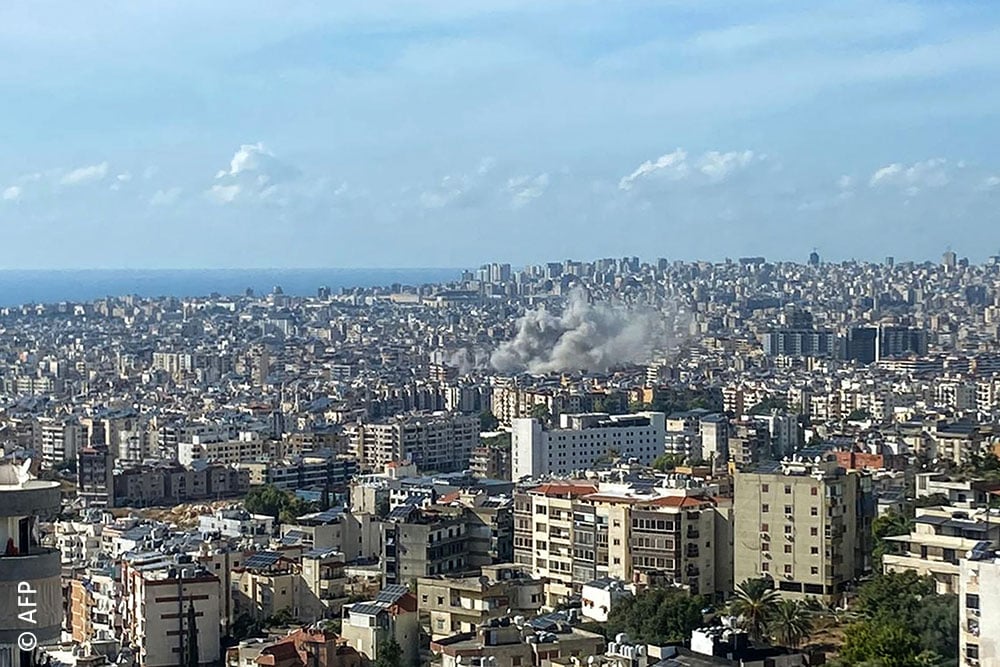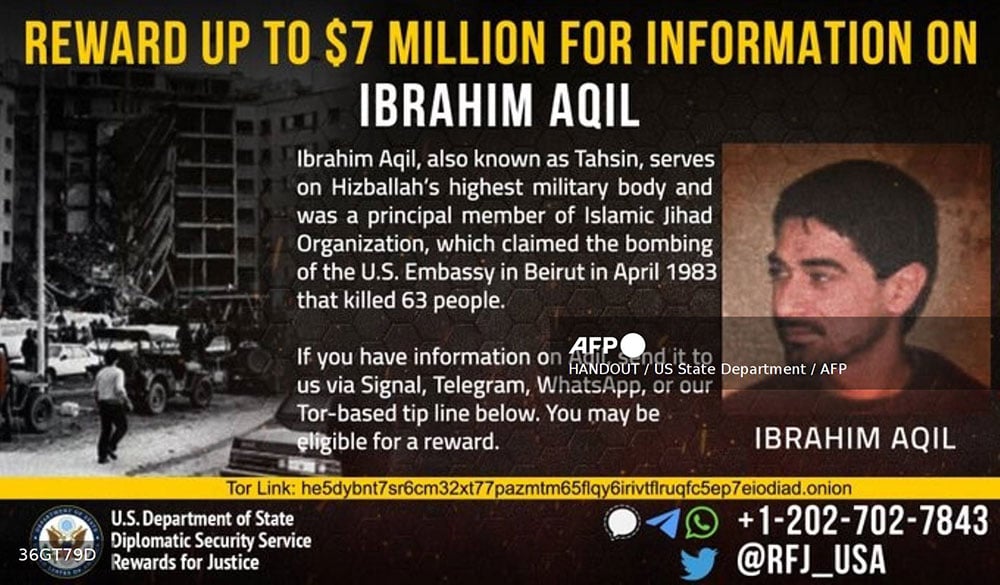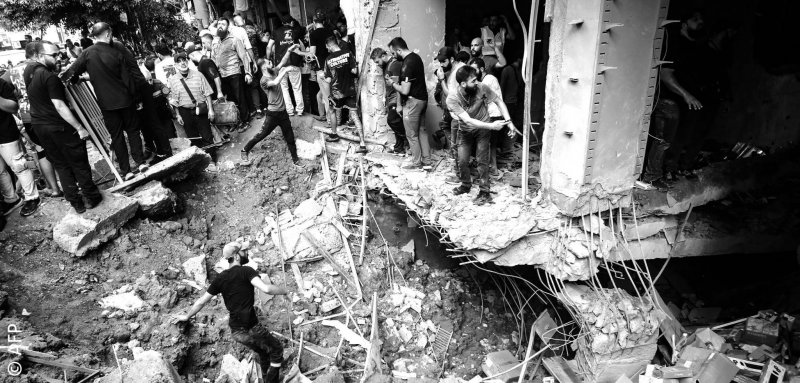In what American newspapers described as "the deadliest attack on Lebanon since the 2006 war," Israeli warplanes bombed the densely populated residential area of Jamous in Beirut’s southern suburbs during rush hour on Friday, September 14, 2024. In retaliation for the attacks on its members in what has become known as the “pager and walkie-talkie bombings" earlier in the week, Hezbollah fired 150 rockets into northern Israel.
The Israeli airstrike on Beirut’s southern suburbs destroyed two residential buildings, killing 37 people, including three children and seven women, while injuring 68 others, nine of whom are in critical condition. With this attack, the total number of people killed by Israeli attacks on Lebanon within just one week has risen to 70. Lebanese Minister of Public Works and Transport Ali Hamieh stated that search and rescue operations are ongoing for 23 missing individuals believed to be trapped under the rubble of the two destroyed buildings.
Lebanese Prime Minister Najib Mikati condemned the attack, calling it "a blatant violation of Lebanese sovereignty," and denounced the airstrike on a densely populated residential area.
The Israeli airstrike on Beirut’s southern suburbs destroyed two residential buildings, killing 37 people, including three children and seven women, while injuring 68 others. Search and rescue operations are ongoing for 23 missing individuals believed to be trapped under the rubble of the two destroyed buildings. With this attack, the total number of people killed by Israeli attacks on Lebanon within just one week has risen to 70.
 The Israeli airstrike on Beirut’s southern suburbs leveled two residential buildings and left scores dead and injured.
The Israeli airstrike on Beirut’s southern suburbs leveled two residential buildings and left scores dead and injured.
The Israeli airstrike on Beirut’s southern suburbs leveled two residential buildings and left scores dead and injured.
Who are Ibrahim Aqil and Ahmad Mahmoud Wehbe?
Hezbollah announced the loss of 11 of its members, including two commanders, Ibrahim Aqil and Mahmoud Wehbe. According to the US State Department, Aqil (born in 1962), the commander of Hezbollah's elite Radwan Force, was responsible for the bombing of the US Embassy in Beirut in April 1983 and was also behind the attack on the US Marine Corps barracks in October 1983. The US had placed a $7 million bounty for information leading to his capture.
Hezbollah's two commanders killed in the strike were Ibrahim Aqil, responsible for the 1983 US Embassy bombing, and Mahmoud Wehbe, who led military operations for Hezbollah's Radwan Force from the beginning of the Israeli war on Gaza in October 2023 until early 2024.
Mahmoud Wehbe (born in 1964) was a key commander in repelling attacks on Lebanon's eastern borders and in various Syrian provinces. He led military operations for the Radwan Force from the onset of Israel's war on Gaza on October 7, 2023, until early 2024, after which he returned to oversee Hezbollah’s central training unit following the killing of Wissam al-Tawil.
 Aqil
Aqil
Israeli media justifies mass civilian casualties
Israeli media reported that “a reliable intelligence source provided information regarding a meeting of Radwan Force leaders in Beirut’s southern suburbs, prompting the military to carry out the assassination.” It was noted that “the assassination plan was prepared immediately and within a short time, and was approved by Chief of Staff Herzi Halevi.”
Israeli newspapers expressed mixed opinions about the attack. In an editorial by the Times of Israel, the airstrike was described as “part of a new phase in the conflict with Hezbollah, emphasizing the importance of targeting the party’s military leaders, such as Ibrahim Aqil, who was considered one of the key military figures within the organization.” The piece warned that the strike could “lead to further escalation with Hezbollah, but it also reflected Israel’s determination to continue defending its citizens, even if it requires intensified strikes in the heart of Beirut's southern suburbs, despite the human loss and the dire consequences of such a strategy.”
Some Israeli publications referred to the airstrike as a "partial response" to a speech by Hezbollah leader Hassan Nasrallah on September 19, 2024, in which he called the Israeli attacks on Hezbollah's communication systems a “declaration of war."
Maariv military correspondent Avi Ashkenazi wrote that “the timing of the strike came at a sensitive moment when Israel's relations with certain international powers are under pressure due to repeated attacks.”
The article pointed out that using such tactics carries inherent risks, and Israel may face severe backlash from the international community, but emphasized the need to maintain military deterrence.
Some opinions in the Israeli press suggested that the airstrike was a "partial response" to a speech by Hezbollah Secretary-General Hassan Nasrallah delivered a day earlier, on September 19, 2024. In his speech, Nasrallah described Israel’s attacks on Hezbollah's communication devices as an act and "declaration of war" and pledged Israel would face a “reckoning” for the massacres that claimed the lives of dozens of the group’s members.
Calls for restraint from the international community
The strike on Beirut's southern suburbs sparked heated debates in the UN Security Council. Lebanon’s foreign minister accused Israel of terrorism, while Tel Aviv's representative insisted that Israel was not seeking to expand the conflict, as the Israeli Prime Minister postponed his trip to New York following the attack.
Both the United Nations and the United States issued statements urging restraint and a de-escalation of tensions, with Washington expressing deep concern over the possible expansion of the conflict. Russia and Jordan also called for calm and diplomatic solutions to avoid further escalation.
The Washington Post published an article titled "A new kind of war is unfolding in Lebanon," arguing that the conflict had already expanded into what could be described as the "Third Lebanon War," given that “Israeli government agencies are regularly killing Hezbollah operatives and Hezbollah is regularly firing rockets across the Lebanese border.”
French President Emmanuel Macron sent a video message of support to the Lebanese people, stating that "Lebanon cannot continue to live under the fear of an imminent war."
The Washington Post published an article titled "A new kind of war is unfolding in Lebanon," arguing that the conflict had already expanded into what could be described as the "Third Lebanon War," given that “Israeli government agencies are regularly killing Hezbollah operatives and Hezbollah is regularly trying to kill Israelis by firing rockets across the Lebanese border.”
What is certain is that the escalating tensions between Israel and Hezbollah, especially after this major airstrike and previous escalations, are expected to lead to further military action from both sides. The coming days may see intensified conflict, exacerbating the humanitarian situation in both Lebanon and Israel.
Who is providing assistance to Lebanon?
Several countries and organizations have provided aid to Lebanon in response to the aftermath of the attacks. According to Lebanon’s Minister of Health, Egypt was the first country to offer assistance, particularly in the health sector and in removing debris to rescue the wounded and missing.
An editorial by the Times of Israel warned that the airstrike could “lead to further escalation with Hezbollah, but it also reflected Israel’s determination to continue defending its citizens, even if it requires intensified strikes in the heart of Beirut's southern suburbs, despite the human loss and the dire consequences of such a strategy.”
The World Health Organization (WHO) confirmed that the explosions severely disrupted Lebanon’s healthcare system. The organization sent emergency medical supplies and blood donations to help deal with emergency cases. WHO stated that these attacks placed immense pressure on Lebanon’s health infrastructure, particularly in South Lebanon and the capital, Beirut.
As of 5 p.m. on September 21, Israeli drones continued flying over the Lebanese capital, while Israeli warplanes continued launching the most intense wave of airstrikes since the start of the war on villages across the south, expanding their fire zone to cover a 50 km radius.
Raseef22 is a not for profit entity. Our focus is on quality journalism. Every contribution to the NasRaseef membership goes directly towards journalism production. We stand independent, not accepting corporate sponsorships, sponsored content or political funding.
Support our mission to keep Raseef22 available to all readers by clicking here!
Interested in writing with us? Check our pitch process here!



